Analyzing Leadership Challenges and Crisis Management at BP Oil
VerifiedAdded on 2022/09/09
|11
|2452
|13
Report
AI Summary
This report provides a comprehensive case study of BP Oil, focusing on the leadership challenges the company has faced, particularly in the context of crisis management. It begins with an introduction to leadership and its role in organizational success, followed by a literature review of relevant leadership theories and their application to crisis situations. The report then delves into the specific case of BP Oil, examining its history, mission, and the Deepwater Horizon oil spill. It analyzes BP's leadership styles, identifies key leadership problems such as denial of wrongdoing and non-functional organizational culture, and discusses issues related to lack of accountability. The report concludes by assessing BP's response to crises, highlighting both shortcomings and efforts to improve, and emphasizing the importance of effective leadership in mitigating the impact of crises. The analysis incorporates various leadership theories and concepts to provide a nuanced understanding of the challenges and potential solutions for BP Oil.
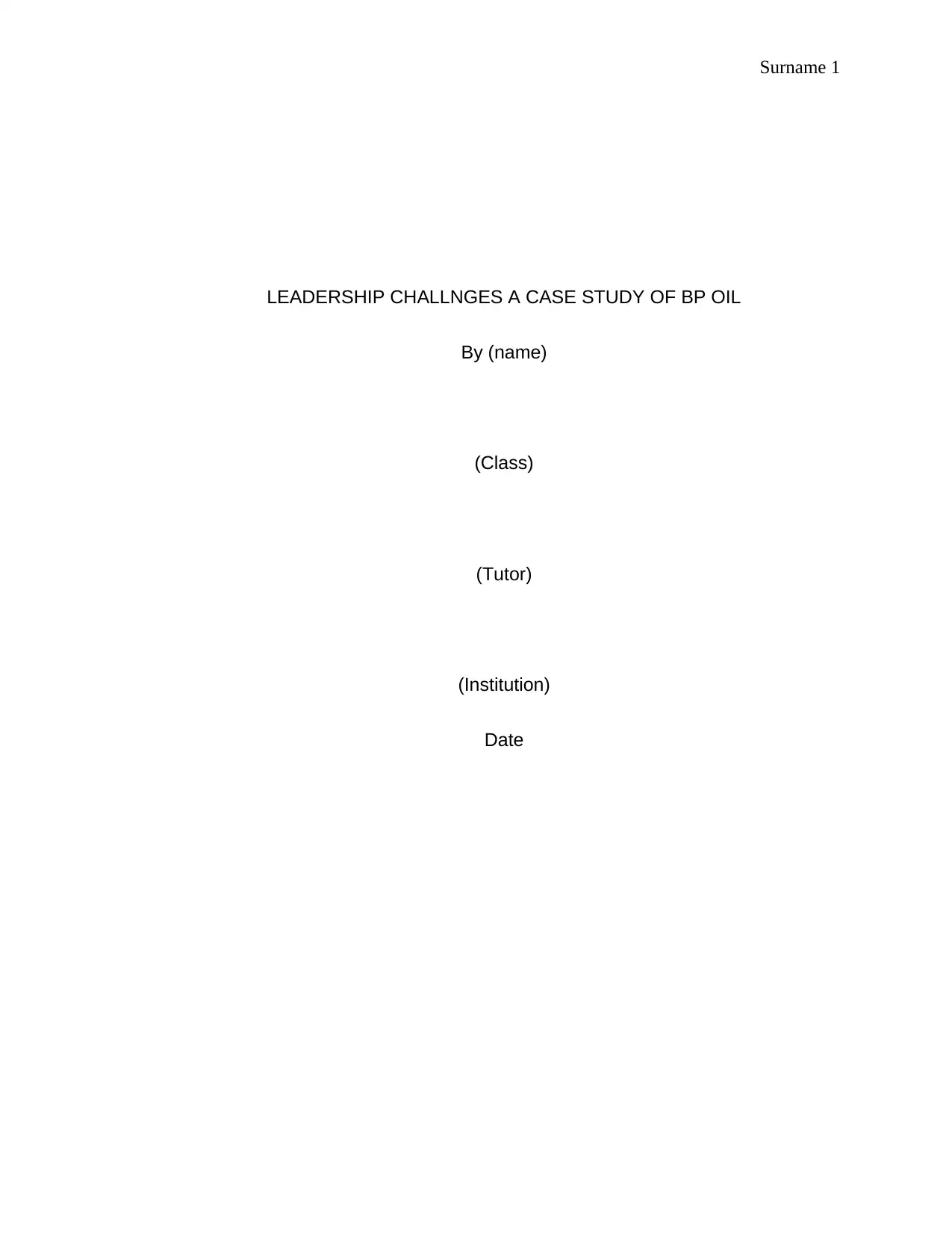
Surname 1
LEADERSHIP CHALLNGES A CASE STUDY OF BP OIL
By (name)
(Class)
(Tutor)
(Institution)
Date
LEADERSHIP CHALLNGES A CASE STUDY OF BP OIL
By (name)
(Class)
(Tutor)
(Institution)
Date
Paraphrase This Document
Need a fresh take? Get an instant paraphrase of this document with our AI Paraphraser
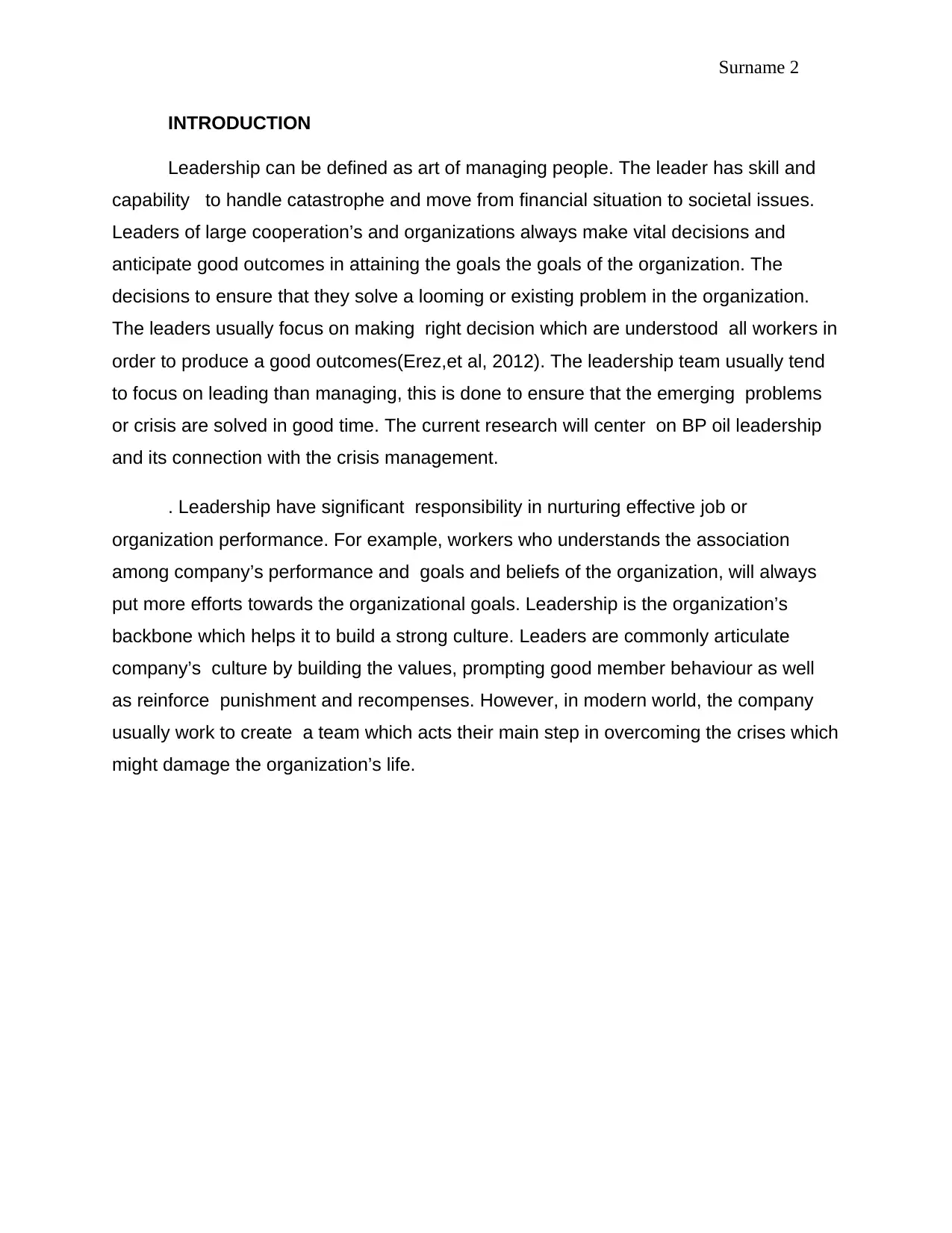
Surname 2
INTRODUCTION
Leadership can be defined as art of managing people. The leader has skill and
capability to handle catastrophe and move from financial situation to societal issues.
Leaders of large cooperation’s and organizations always make vital decisions and
anticipate good outcomes in attaining the goals the goals of the organization. The
decisions to ensure that they solve a looming or existing problem in the organization.
The leaders usually focus on making right decision which are understood all workers in
order to produce a good outcomes(Erez,et al, 2012). The leadership team usually tend
to focus on leading than managing, this is done to ensure that the emerging problems
or crisis are solved in good time. The current research will center on BP oil leadership
and its connection with the crisis management.
. Leadership have significant responsibility in nurturing effective job or
organization performance. For example, workers who understands the association
among company’s performance and goals and beliefs of the organization, will always
put more efforts towards the organizational goals. Leadership is the organization’s
backbone which helps it to build a strong culture. Leaders are commonly articulate
company’s culture by building the values, prompting good member behaviour as well
as reinforce punishment and recompenses. However, in modern world, the company
usually work to create a team which acts their main step in overcoming the crises which
might damage the organization’s life.
INTRODUCTION
Leadership can be defined as art of managing people. The leader has skill and
capability to handle catastrophe and move from financial situation to societal issues.
Leaders of large cooperation’s and organizations always make vital decisions and
anticipate good outcomes in attaining the goals the goals of the organization. The
decisions to ensure that they solve a looming or existing problem in the organization.
The leaders usually focus on making right decision which are understood all workers in
order to produce a good outcomes(Erez,et al, 2012). The leadership team usually tend
to focus on leading than managing, this is done to ensure that the emerging problems
or crisis are solved in good time. The current research will center on BP oil leadership
and its connection with the crisis management.
. Leadership have significant responsibility in nurturing effective job or
organization performance. For example, workers who understands the association
among company’s performance and goals and beliefs of the organization, will always
put more efforts towards the organizational goals. Leadership is the organization’s
backbone which helps it to build a strong culture. Leaders are commonly articulate
company’s culture by building the values, prompting good member behaviour as well
as reinforce punishment and recompenses. However, in modern world, the company
usually work to create a team which acts their main step in overcoming the crises which
might damage the organization’s life.
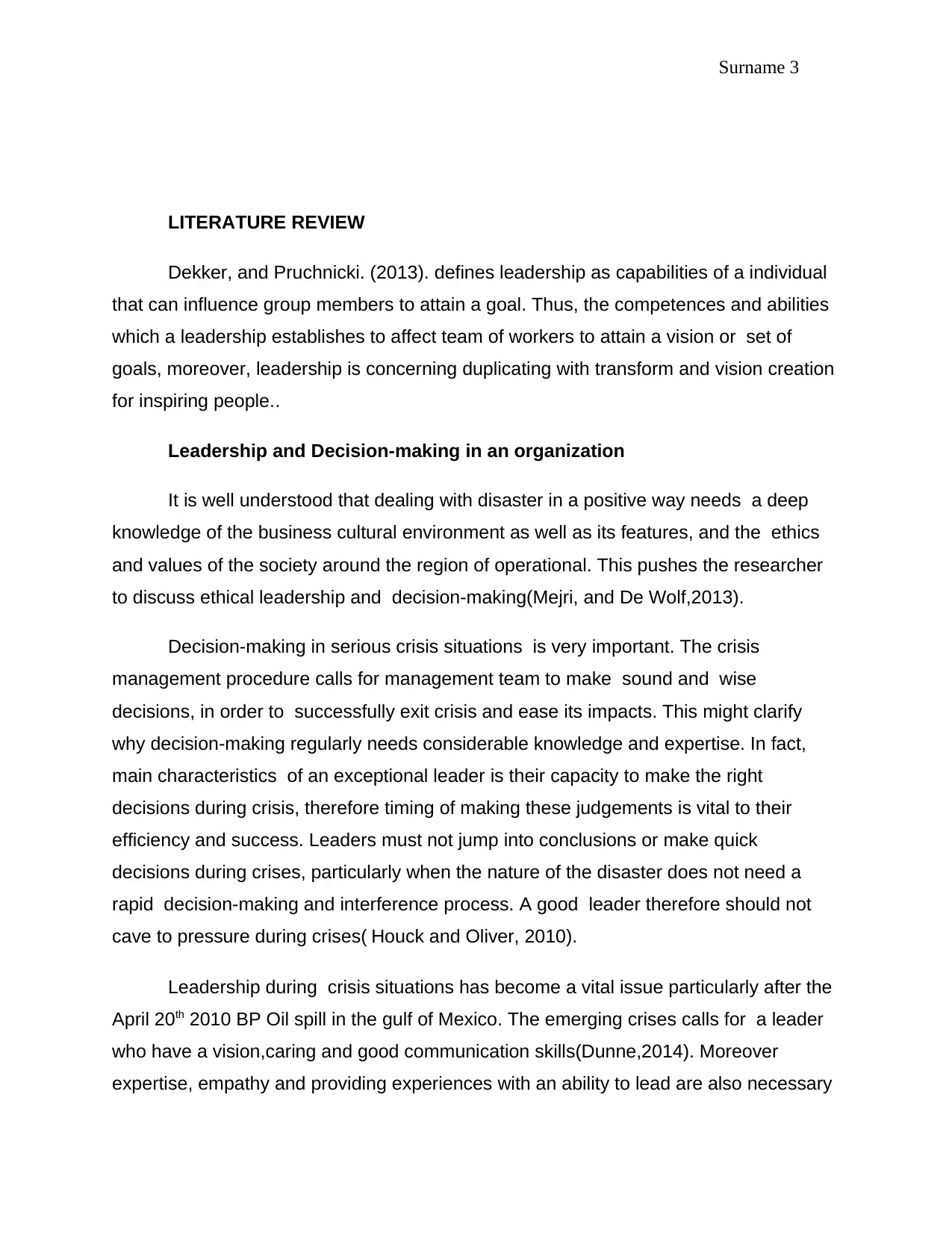
Surname 3
LITERATURE REVIEW
Dekker, and Pruchnicki. (2013). defines leadership as capabilities of a individual
that can influence group members to attain a goal. Thus, the competences and abilities
which a leadership establishes to affect team of workers to attain a vision or set of
goals, moreover, leadership is concerning duplicating with transform and vision creation
for inspiring people..
Leadership and Decision-making in an organization
It is well understood that dealing with disaster in a positive way needs a deep
knowledge of the business cultural environment as well as its features, and the ethics
and values of the society around the region of operational. This pushes the researcher
to discuss ethical leadership and decision-making(Mejri, and De Wolf,2013).
Decision-making in serious crisis situations is very important. The crisis
management procedure calls for management team to make sound and wise
decisions, in order to successfully exit crisis and ease its impacts. This might clarify
why decision-making regularly needs considerable knowledge and expertise. In fact,
main characteristics of an exceptional leader is their capacity to make the right
decisions during crisis, therefore timing of making these judgements is vital to their
efficiency and success. Leaders must not jump into conclusions or make quick
decisions during crises, particularly when the nature of the disaster does not need a
rapid decision-making and interference process. A good leader therefore should not
cave to pressure during crises( Houck and Oliver, 2010).
Leadership during crisis situations has become a vital issue particularly after the
April 20th 2010 BP Oil spill in the gulf of Mexico. The emerging crises calls for a leader
who have a vision,caring and good communication skills(Dunne,2014). Moreover
expertise, empathy and providing experiences with an ability to lead are also necessary
LITERATURE REVIEW
Dekker, and Pruchnicki. (2013). defines leadership as capabilities of a individual
that can influence group members to attain a goal. Thus, the competences and abilities
which a leadership establishes to affect team of workers to attain a vision or set of
goals, moreover, leadership is concerning duplicating with transform and vision creation
for inspiring people..
Leadership and Decision-making in an organization
It is well understood that dealing with disaster in a positive way needs a deep
knowledge of the business cultural environment as well as its features, and the ethics
and values of the society around the region of operational. This pushes the researcher
to discuss ethical leadership and decision-making(Mejri, and De Wolf,2013).
Decision-making in serious crisis situations is very important. The crisis
management procedure calls for management team to make sound and wise
decisions, in order to successfully exit crisis and ease its impacts. This might clarify
why decision-making regularly needs considerable knowledge and expertise. In fact,
main characteristics of an exceptional leader is their capacity to make the right
decisions during crisis, therefore timing of making these judgements is vital to their
efficiency and success. Leaders must not jump into conclusions or make quick
decisions during crises, particularly when the nature of the disaster does not need a
rapid decision-making and interference process. A good leader therefore should not
cave to pressure during crises( Houck and Oliver, 2010).
Leadership during crisis situations has become a vital issue particularly after the
April 20th 2010 BP Oil spill in the gulf of Mexico. The emerging crises calls for a leader
who have a vision,caring and good communication skills(Dunne,2014). Moreover
expertise, empathy and providing experiences with an ability to lead are also necessary
⊘ This is a preview!⊘
Do you want full access?
Subscribe today to unlock all pages.

Trusted by 1+ million students worldwide
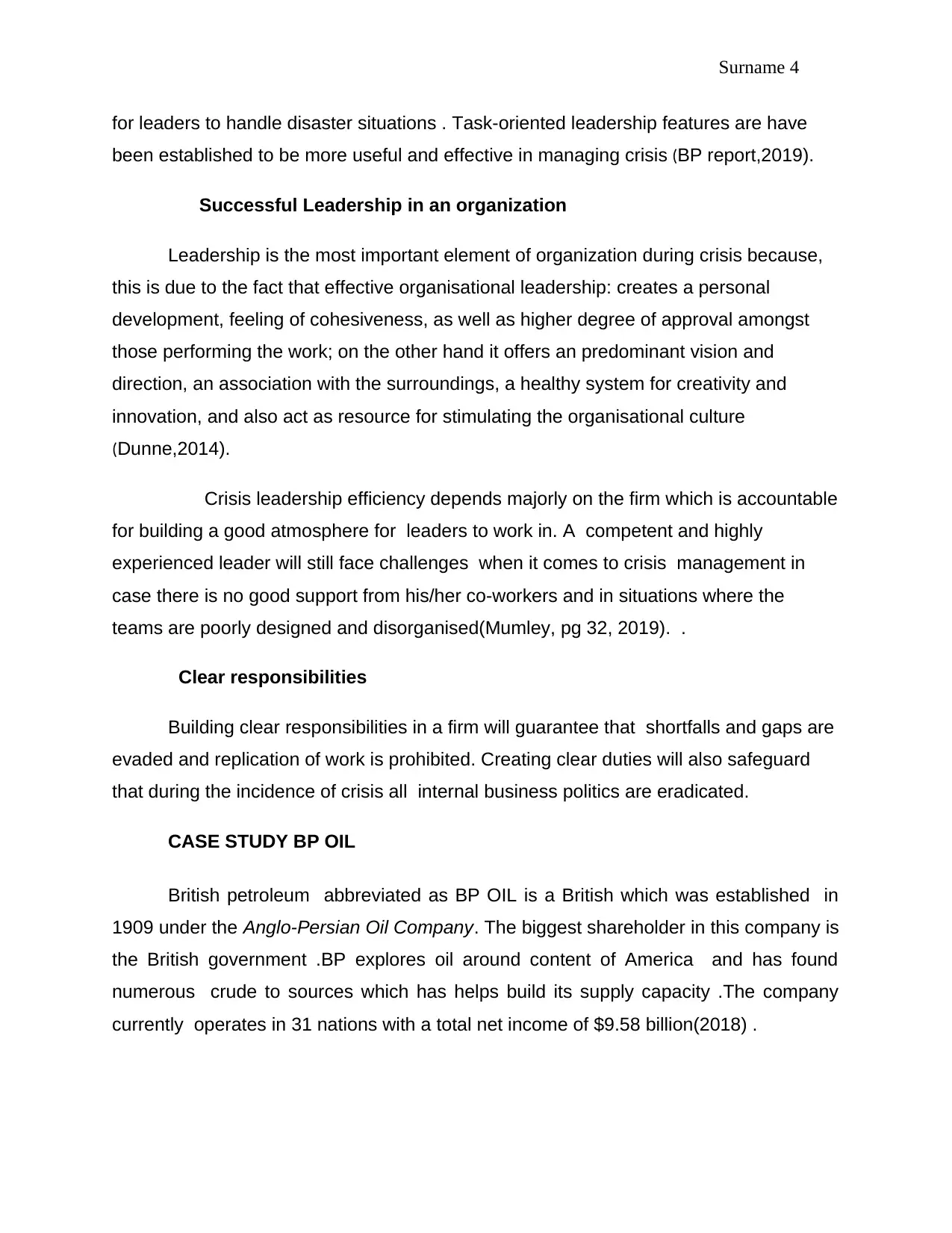
Surname 4
for leaders to handle disaster situations . Task-oriented leadership features are have
been established to be more useful and effective in managing crisis (BP report,2019).
Successful Leadership in an organization
Leadership is the most important element of organization during crisis because,
this is due to the fact that effective organisational leadership: creates a personal
development, feeling of cohesiveness, as well as higher degree of approval amongst
those performing the work; on the other hand it offers an predominant vision and
direction, an association with the surroundings, a healthy system for creativity and
innovation, and also act as resource for stimulating the organisational culture
(Dunne,2014).
Crisis leadership efficiency depends majorly on the firm which is accountable
for building a good atmosphere for leaders to work in. A competent and highly
experienced leader will still face challenges when it comes to crisis management in
case there is no good support from his/her co-workers and in situations where the
teams are poorly designed and disorganised(Mumley, pg 32, 2019). .
Clear responsibilities
Building clear responsibilities in a firm will guarantee that shortfalls and gaps are
evaded and replication of work is prohibited. Creating clear duties will also safeguard
that during the incidence of crisis all internal business politics are eradicated.
CASE STUDY BP OIL
British petroleum abbreviated as BP OIL is a British which was established in
1909 under the Anglo-Persian Oil Company. The biggest shareholder in this company is
the British government .BP explores oil around content of America and has found
numerous crude to sources which has helps build its supply capacity .The company
currently operates in 31 nations with a total net income of $9.58 billion(2018) .
for leaders to handle disaster situations . Task-oriented leadership features are have
been established to be more useful and effective in managing crisis (BP report,2019).
Successful Leadership in an organization
Leadership is the most important element of organization during crisis because,
this is due to the fact that effective organisational leadership: creates a personal
development, feeling of cohesiveness, as well as higher degree of approval amongst
those performing the work; on the other hand it offers an predominant vision and
direction, an association with the surroundings, a healthy system for creativity and
innovation, and also act as resource for stimulating the organisational culture
(Dunne,2014).
Crisis leadership efficiency depends majorly on the firm which is accountable
for building a good atmosphere for leaders to work in. A competent and highly
experienced leader will still face challenges when it comes to crisis management in
case there is no good support from his/her co-workers and in situations where the
teams are poorly designed and disorganised(Mumley, pg 32, 2019). .
Clear responsibilities
Building clear responsibilities in a firm will guarantee that shortfalls and gaps are
evaded and replication of work is prohibited. Creating clear duties will also safeguard
that during the incidence of crisis all internal business politics are eradicated.
CASE STUDY BP OIL
British petroleum abbreviated as BP OIL is a British which was established in
1909 under the Anglo-Persian Oil Company. The biggest shareholder in this company is
the British government .BP explores oil around content of America and has found
numerous crude to sources which has helps build its supply capacity .The company
currently operates in 31 nations with a total net income of $9.58 billion(2018) .
Paraphrase This Document
Need a fresh take? Get an instant paraphrase of this document with our AI Paraphraser
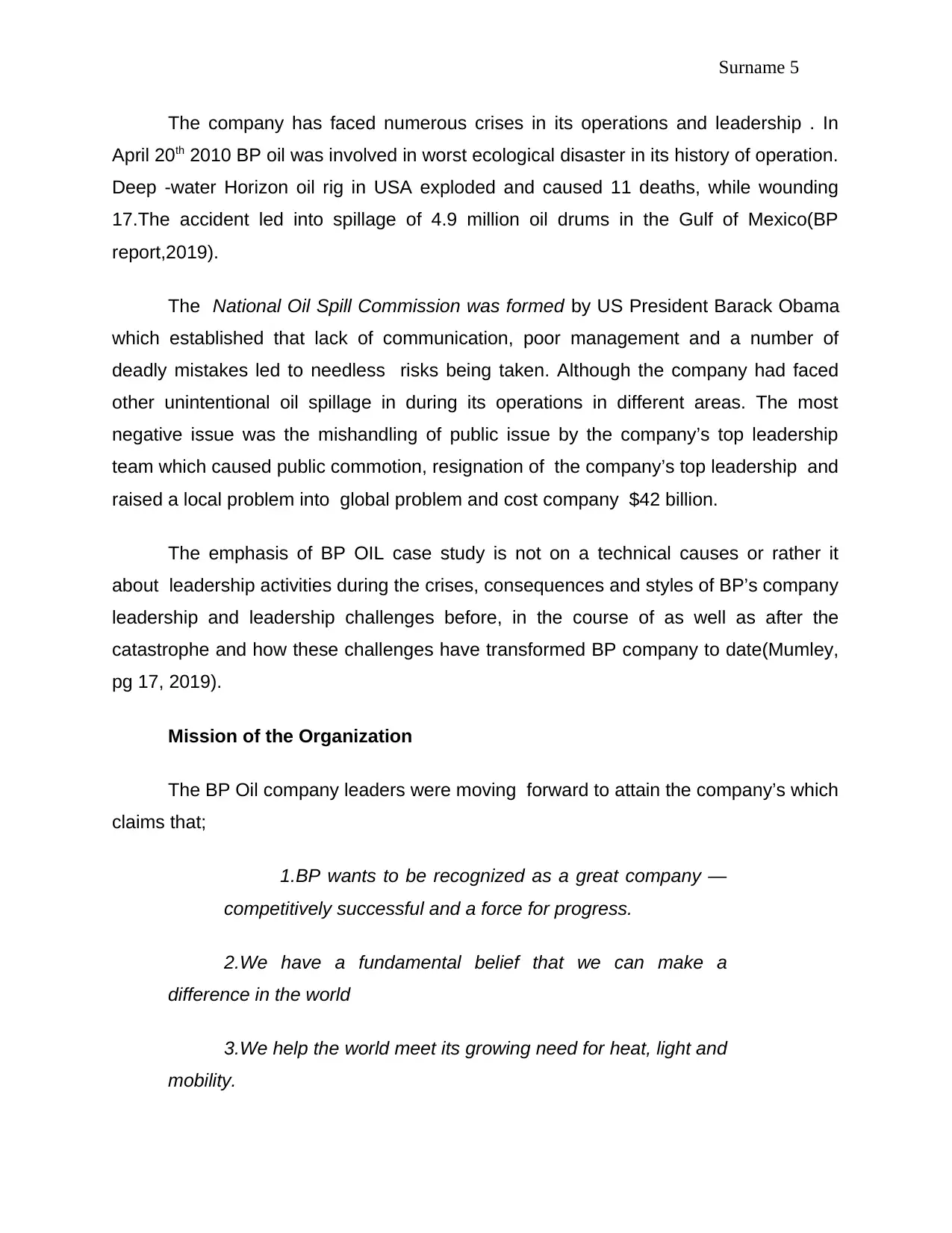
Surname 5
The company has faced numerous crises in its operations and leadership . In
April 20th 2010 BP oil was involved in worst ecological disaster in its history of operation.
Deep -water Horizon oil rig in USA exploded and caused 11 deaths, while wounding
17.The accident led into spillage of 4.9 million oil drums in the Gulf of Mexico(BP
report,2019).
The National Oil Spill Commission was formed by US President Barack Obama
which established that lack of communication, poor management and a number of
deadly mistakes led to needless risks being taken. Although the company had faced
other unintentional oil spillage in during its operations in different areas. The most
negative issue was the mishandling of public issue by the company’s top leadership
team which caused public commotion, resignation of the company’s top leadership and
raised a local problem into global problem and cost company $42 billion.
The emphasis of BP OIL case study is not on a technical causes or rather it
about leadership activities during the crises, consequences and styles of BP’s company
leadership and leadership challenges before, in the course of as well as after the
catastrophe and how these challenges have transformed BP company to date(Mumley,
pg 17, 2019).
Mission of the Organization
The BP Oil company leaders were moving forward to attain the company’s which
claims that;
1.BP wants to be recognized as a great company —
competitively successful and a force for progress.
2.We have a fundamental belief that we can make a
difference in the world
3.We help the world meet its growing need for heat, light and
mobility.
The company has faced numerous crises in its operations and leadership . In
April 20th 2010 BP oil was involved in worst ecological disaster in its history of operation.
Deep -water Horizon oil rig in USA exploded and caused 11 deaths, while wounding
17.The accident led into spillage of 4.9 million oil drums in the Gulf of Mexico(BP
report,2019).
The National Oil Spill Commission was formed by US President Barack Obama
which established that lack of communication, poor management and a number of
deadly mistakes led to needless risks being taken. Although the company had faced
other unintentional oil spillage in during its operations in different areas. The most
negative issue was the mishandling of public issue by the company’s top leadership
team which caused public commotion, resignation of the company’s top leadership and
raised a local problem into global problem and cost company $42 billion.
The emphasis of BP OIL case study is not on a technical causes or rather it
about leadership activities during the crises, consequences and styles of BP’s company
leadership and leadership challenges before, in the course of as well as after the
catastrophe and how these challenges have transformed BP company to date(Mumley,
pg 17, 2019).
Mission of the Organization
The BP Oil company leaders were moving forward to attain the company’s which
claims that;
1.BP wants to be recognized as a great company —
competitively successful and a force for progress.
2.We have a fundamental belief that we can make a
difference in the world
3.We help the world meet its growing need for heat, light and
mobility.
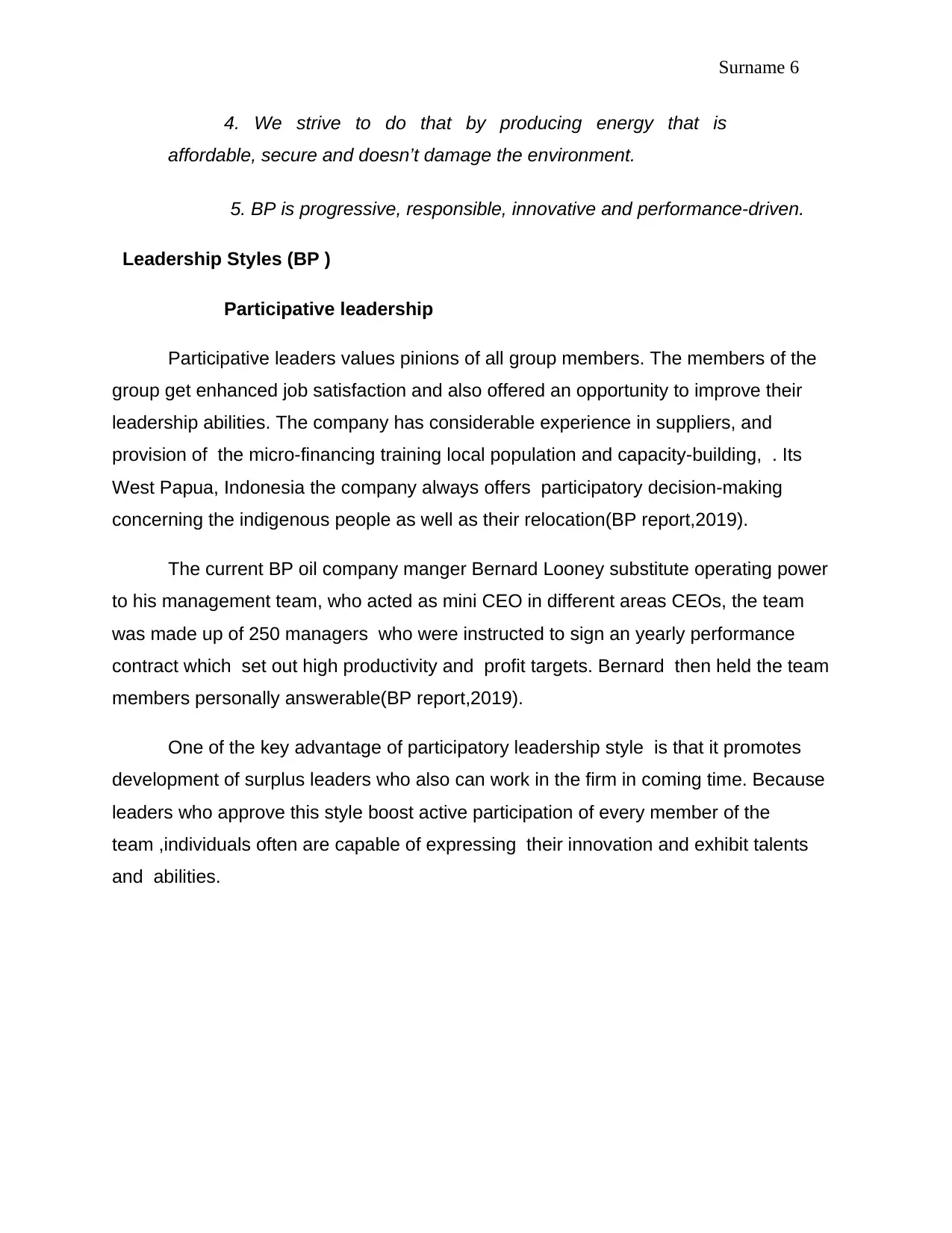
Surname 6
4. We strive to do that by producing energy that is
affordable, secure and doesn’t damage the environment.
5. BP is progressive, responsible, innovative and performance-driven.
Leadership Styles (BP )
Participative leadership
Participative leaders values pinions of all group members. The members of the
group get enhanced job satisfaction and also offered an opportunity to improve their
leadership abilities. The company has considerable experience in suppliers, and
provision of the micro-financing training local population and capacity-building, . Its
West Papua, Indonesia the company always offers participatory decision-making
concerning the indigenous people as well as their relocation(BP report,2019).
The current BP oil company manger Bernard Looney substitute operating power
to his management team, who acted as mini CEO in different areas CEOs, the team
was made up of 250 managers who were instructed to sign an yearly performance
contract which set out high productivity and profit targets. Bernard then held the team
members personally answerable(BP report,2019).
One of the key advantage of participatory leadership style is that it promotes
development of surplus leaders who also can work in the firm in coming time. Because
leaders who approve this style boost active participation of every member of the
team ,individuals often are capable of expressing their innovation and exhibit talents
and abilities.
4. We strive to do that by producing energy that is
affordable, secure and doesn’t damage the environment.
5. BP is progressive, responsible, innovative and performance-driven.
Leadership Styles (BP )
Participative leadership
Participative leaders values pinions of all group members. The members of the
group get enhanced job satisfaction and also offered an opportunity to improve their
leadership abilities. The company has considerable experience in suppliers, and
provision of the micro-financing training local population and capacity-building, . Its
West Papua, Indonesia the company always offers participatory decision-making
concerning the indigenous people as well as their relocation(BP report,2019).
The current BP oil company manger Bernard Looney substitute operating power
to his management team, who acted as mini CEO in different areas CEOs, the team
was made up of 250 managers who were instructed to sign an yearly performance
contract which set out high productivity and profit targets. Bernard then held the team
members personally answerable(BP report,2019).
One of the key advantage of participatory leadership style is that it promotes
development of surplus leaders who also can work in the firm in coming time. Because
leaders who approve this style boost active participation of every member of the
team ,individuals often are capable of expressing their innovation and exhibit talents
and abilities.
⊘ This is a preview!⊘
Do you want full access?
Subscribe today to unlock all pages.

Trusted by 1+ million students worldwide
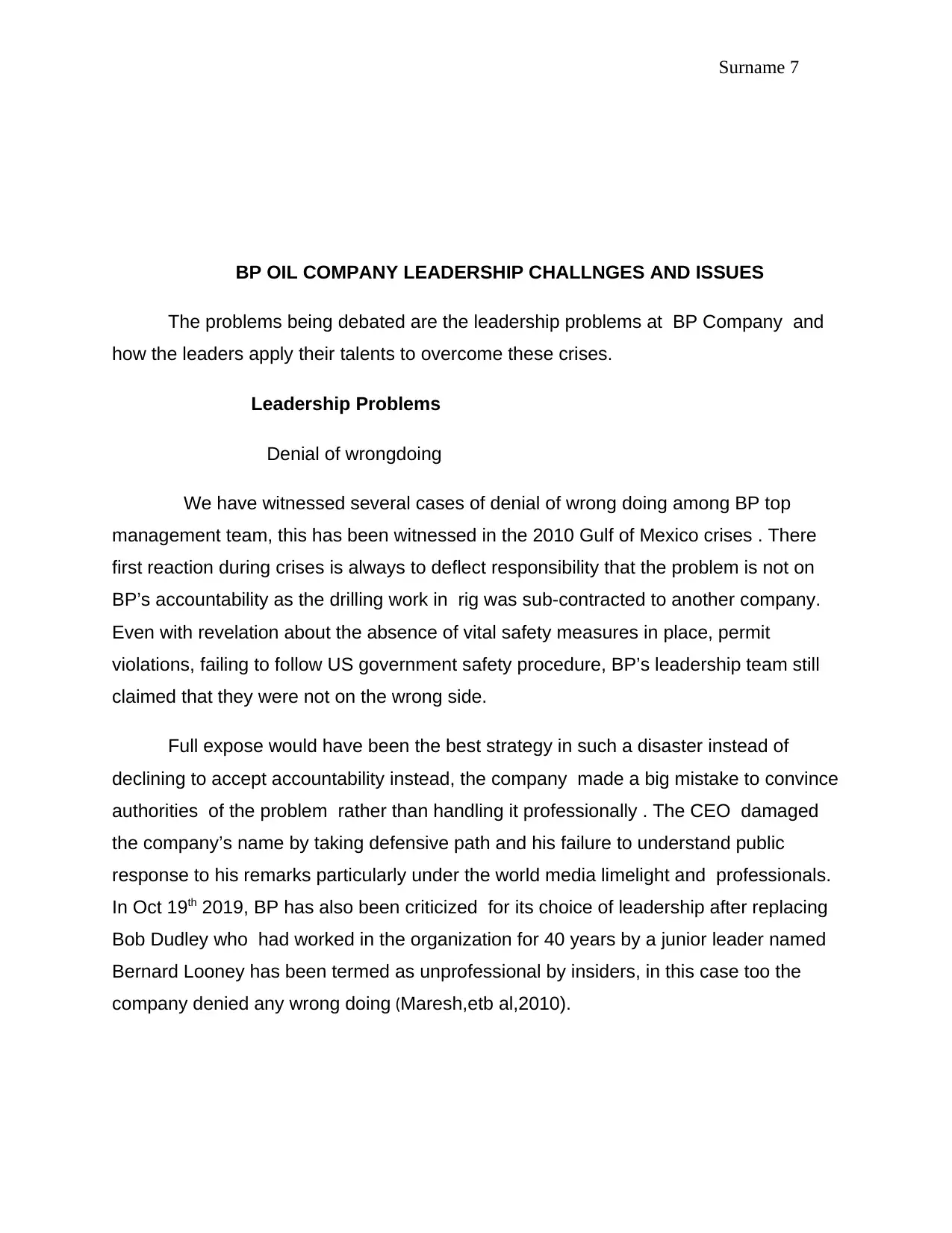
Surname 7
BP OIL COMPANY LEADERSHIP CHALLNGES AND ISSUES
The problems being debated are the leadership problems at BP Company and
how the leaders apply their talents to overcome these crises.
Leadership Problems
Denial of wrongdoing
We have witnessed several cases of denial of wrong doing among BP top
management team, this has been witnessed in the 2010 Gulf of Mexico crises . There
first reaction during crises is always to deflect responsibility that the problem is not on
BP’s accountability as the drilling work in rig was sub-contracted to another company.
Even with revelation about the absence of vital safety measures in place, permit
violations, failing to follow US government safety procedure, BP’s leadership team still
claimed that they were not on the wrong side.
Full expose would have been the best strategy in such a disaster instead of
declining to accept accountability instead, the company made a big mistake to convince
authorities of the problem rather than handling it professionally . The CEO damaged
the company’s name by taking defensive path and his failure to understand public
response to his remarks particularly under the world media limelight and professionals.
In Oct 19th 2019, BP has also been criticized for its choice of leadership after replacing
Bob Dudley who had worked in the organization for 40 years by a junior leader named
Bernard Looney has been termed as unprofessional by insiders, in this case too the
company denied any wrong doing (Maresh,etb al,2010).
BP OIL COMPANY LEADERSHIP CHALLNGES AND ISSUES
The problems being debated are the leadership problems at BP Company and
how the leaders apply their talents to overcome these crises.
Leadership Problems
Denial of wrongdoing
We have witnessed several cases of denial of wrong doing among BP top
management team, this has been witnessed in the 2010 Gulf of Mexico crises . There
first reaction during crises is always to deflect responsibility that the problem is not on
BP’s accountability as the drilling work in rig was sub-contracted to another company.
Even with revelation about the absence of vital safety measures in place, permit
violations, failing to follow US government safety procedure, BP’s leadership team still
claimed that they were not on the wrong side.
Full expose would have been the best strategy in such a disaster instead of
declining to accept accountability instead, the company made a big mistake to convince
authorities of the problem rather than handling it professionally . The CEO damaged
the company’s name by taking defensive path and his failure to understand public
response to his remarks particularly under the world media limelight and professionals.
In Oct 19th 2019, BP has also been criticized for its choice of leadership after replacing
Bob Dudley who had worked in the organization for 40 years by a junior leader named
Bernard Looney has been termed as unprofessional by insiders, in this case too the
company denied any wrong doing (Maresh,etb al,2010).
Paraphrase This Document
Need a fresh take? Get an instant paraphrase of this document with our AI Paraphraser
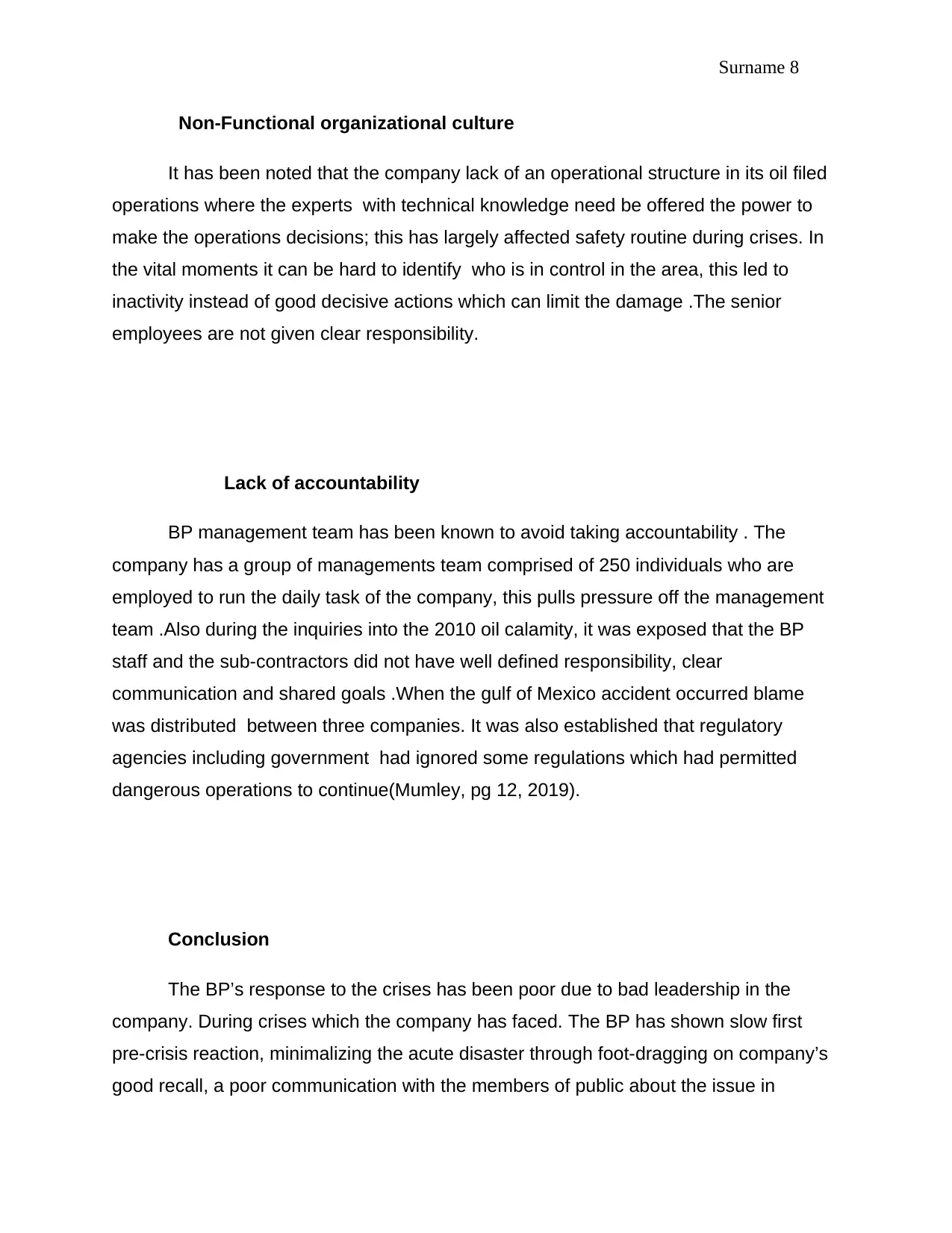
Surname 8
Non-Functional organizational culture
It has been noted that the company lack of an operational structure in its oil filed
operations where the experts with technical knowledge need be offered the power to
make the operations decisions; this has largely affected safety routine during crises. In
the vital moments it can be hard to identify who is in control in the area, this led to
inactivity instead of good decisive actions which can limit the damage .The senior
employees are not given clear responsibility.
Lack of accountability
BP management team has been known to avoid taking accountability . The
company has a group of managements team comprised of 250 individuals who are
employed to run the daily task of the company, this pulls pressure off the management
team .Also during the inquiries into the 2010 oil calamity, it was exposed that the BP
staff and the sub-contractors did not have well defined responsibility, clear
communication and shared goals .When the gulf of Mexico accident occurred blame
was distributed between three companies. It was also established that regulatory
agencies including government had ignored some regulations which had permitted
dangerous operations to continue(Mumley, pg 12, 2019).
Conclusion
The BP’s response to the crises has been poor due to bad leadership in the
company. During crises which the company has faced. The BP has shown slow first
pre-crisis reaction, minimalizing the acute disaster through foot-dragging on company’s
good recall, a poor communication with the members of public about the issue in
Non-Functional organizational culture
It has been noted that the company lack of an operational structure in its oil filed
operations where the experts with technical knowledge need be offered the power to
make the operations decisions; this has largely affected safety routine during crises. In
the vital moments it can be hard to identify who is in control in the area, this led to
inactivity instead of good decisive actions which can limit the damage .The senior
employees are not given clear responsibility.
Lack of accountability
BP management team has been known to avoid taking accountability . The
company has a group of managements team comprised of 250 individuals who are
employed to run the daily task of the company, this pulls pressure off the management
team .Also during the inquiries into the 2010 oil calamity, it was exposed that the BP
staff and the sub-contractors did not have well defined responsibility, clear
communication and shared goals .When the gulf of Mexico accident occurred blame
was distributed between three companies. It was also established that regulatory
agencies including government had ignored some regulations which had permitted
dangerous operations to continue(Mumley, pg 12, 2019).
Conclusion
The BP’s response to the crises has been poor due to bad leadership in the
company. During crises which the company has faced. The BP has shown slow first
pre-crisis reaction, minimalizing the acute disaster through foot-dragging on company’s
good recall, a poor communication with the members of public about the issue in
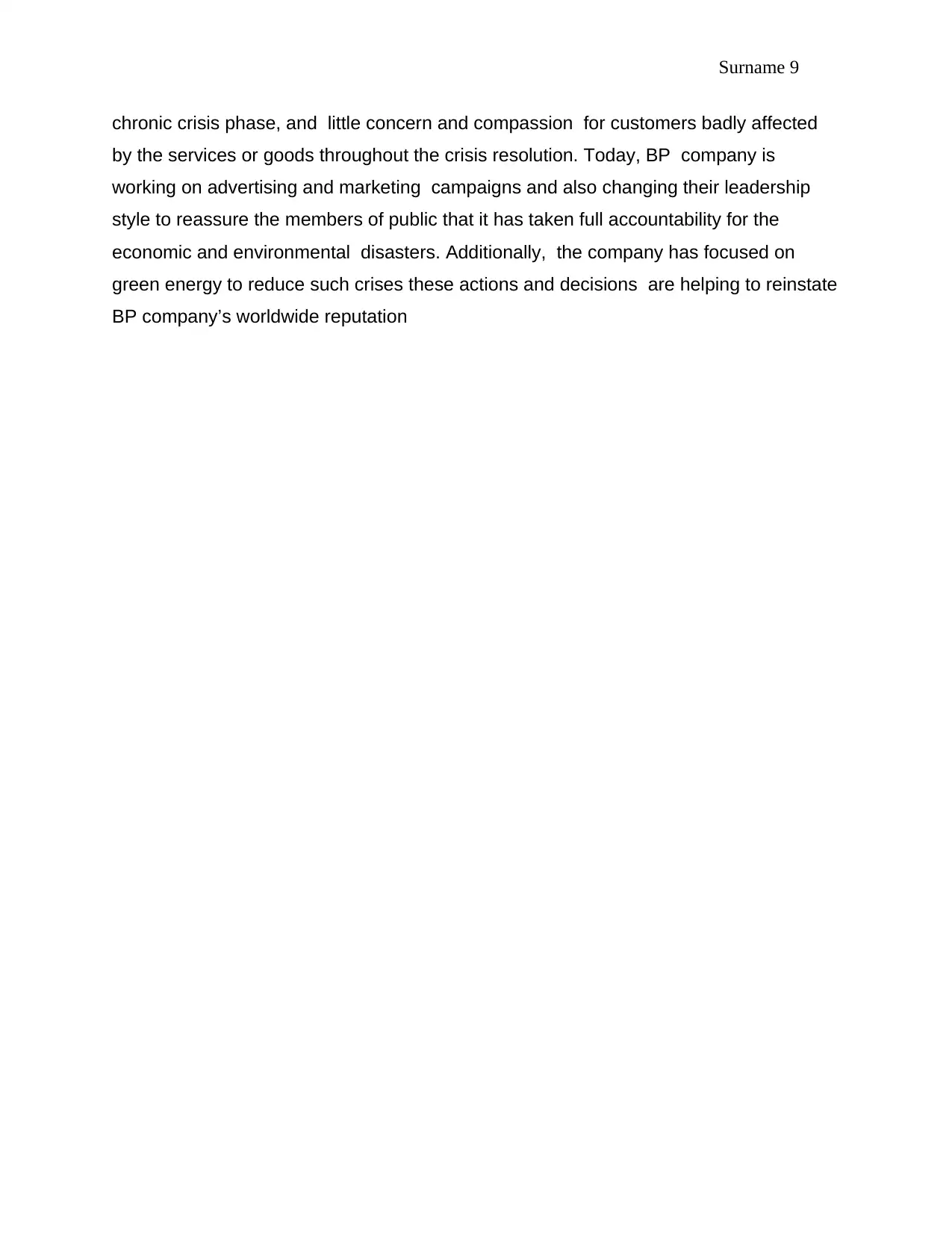
Surname 9
chronic crisis phase, and little concern and compassion for customers badly affected
by the services or goods throughout the crisis resolution. Today, BP company is
working on advertising and marketing campaigns and also changing their leadership
style to reassure the members of public that it has taken full accountability for the
economic and environmental disasters. Additionally, the company has focused on
green energy to reduce such crises these actions and decisions are helping to reinstate
BP company’s worldwide reputation
chronic crisis phase, and little concern and compassion for customers badly affected
by the services or goods throughout the crisis resolution. Today, BP company is
working on advertising and marketing campaigns and also changing their leadership
style to reassure the members of public that it has taken full accountability for the
economic and environmental disasters. Additionally, the company has focused on
green energy to reduce such crises these actions and decisions are helping to reinstate
BP company’s worldwide reputation
⊘ This is a preview!⊘
Do you want full access?
Subscribe today to unlock all pages.

Trusted by 1+ million students worldwide
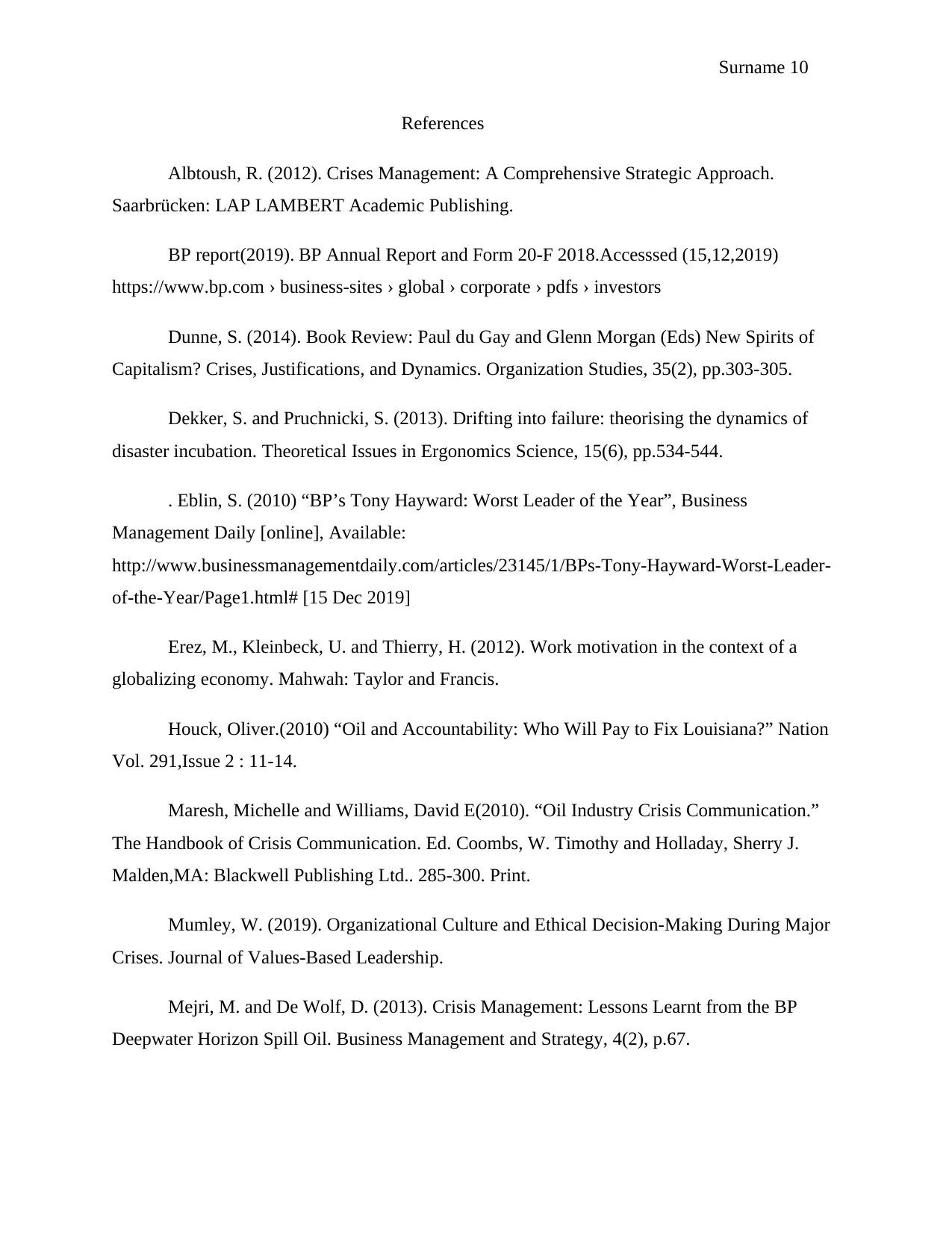
Surname 10
References
Albtoush, R. (2012). Crises Management: A Comprehensive Strategic Approach.
Saarbrücken: LAP LAMBERT Academic Publishing.
BP report(2019). BP Annual Report and Form 20-F 2018.Accesssed (15,12,2019)
https://www.bp.com › business-sites › global › corporate › pdfs › investors
Dunne, S. (2014). Book Review: Paul du Gay and Glenn Morgan (Eds) New Spirits of
Capitalism? Crises, Justifications, and Dynamics. Organization Studies, 35(2), pp.303-305.
Dekker, S. and Pruchnicki, S. (2013). Drifting into failure: theorising the dynamics of
disaster incubation. Theoretical Issues in Ergonomics Science, 15(6), pp.534-544.
. Eblin, S. (2010) “BP’s Tony Hayward: Worst Leader of the Year”, Business
Management Daily [online], Available:
http://www.businessmanagementdaily.com/articles/23145/1/BPs-Tony-Hayward-Worst-Leader-
of-the-Year/Page1.html# [15 Dec 2019]
Erez, M., Kleinbeck, U. and Thierry, H. (2012). Work motivation in the context of a
globalizing economy. Mahwah: Taylor and Francis.
Houck, Oliver.(2010) “Oil and Accountability: Who Will Pay to Fix Louisiana?” Nation
Vol. 291,Issue 2 : 11-14.
Maresh, Michelle and Williams, David E(2010). “Oil Industry Crisis Communication.”
The Handbook of Crisis Communication. Ed. Coombs, W. Timothy and Holladay, Sherry J.
Malden,MA: Blackwell Publishing Ltd.. 285-300. Print.
Mumley, W. (2019). Organizational Culture and Ethical Decision-Making During Major
Crises. Journal of Values-Based Leadership.
Mejri, M. and De Wolf, D. (2013). Crisis Management: Lessons Learnt from the BP
Deepwater Horizon Spill Oil. Business Management and Strategy, 4(2), p.67.
References
Albtoush, R. (2012). Crises Management: A Comprehensive Strategic Approach.
Saarbrücken: LAP LAMBERT Academic Publishing.
BP report(2019). BP Annual Report and Form 20-F 2018.Accesssed (15,12,2019)
https://www.bp.com › business-sites › global › corporate › pdfs › investors
Dunne, S. (2014). Book Review: Paul du Gay and Glenn Morgan (Eds) New Spirits of
Capitalism? Crises, Justifications, and Dynamics. Organization Studies, 35(2), pp.303-305.
Dekker, S. and Pruchnicki, S. (2013). Drifting into failure: theorising the dynamics of
disaster incubation. Theoretical Issues in Ergonomics Science, 15(6), pp.534-544.
. Eblin, S. (2010) “BP’s Tony Hayward: Worst Leader of the Year”, Business
Management Daily [online], Available:
http://www.businessmanagementdaily.com/articles/23145/1/BPs-Tony-Hayward-Worst-Leader-
of-the-Year/Page1.html# [15 Dec 2019]
Erez, M., Kleinbeck, U. and Thierry, H. (2012). Work motivation in the context of a
globalizing economy. Mahwah: Taylor and Francis.
Houck, Oliver.(2010) “Oil and Accountability: Who Will Pay to Fix Louisiana?” Nation
Vol. 291,Issue 2 : 11-14.
Maresh, Michelle and Williams, David E(2010). “Oil Industry Crisis Communication.”
The Handbook of Crisis Communication. Ed. Coombs, W. Timothy and Holladay, Sherry J.
Malden,MA: Blackwell Publishing Ltd.. 285-300. Print.
Mumley, W. (2019). Organizational Culture and Ethical Decision-Making During Major
Crises. Journal of Values-Based Leadership.
Mejri, M. and De Wolf, D. (2013). Crisis Management: Lessons Learnt from the BP
Deepwater Horizon Spill Oil. Business Management and Strategy, 4(2), p.67.
Paraphrase This Document
Need a fresh take? Get an instant paraphrase of this document with our AI Paraphraser
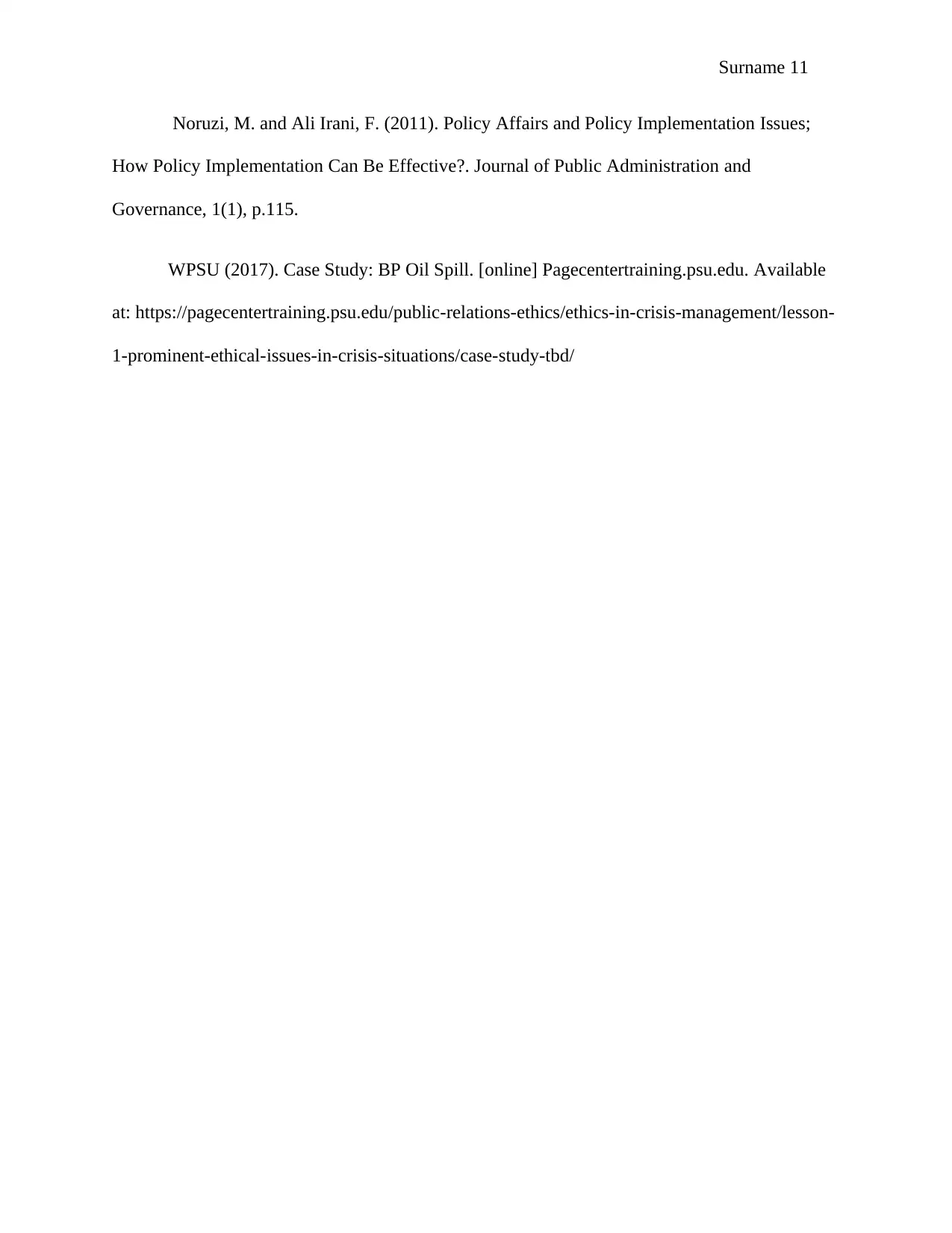
Surname 11
Noruzi, M. and Ali Irani, F. (2011). Policy Affairs and Policy Implementation Issues;
How Policy Implementation Can Be Effective?. Journal of Public Administration and
Governance, 1(1), p.115.
WPSU (2017). Case Study: BP Oil Spill. [online] Pagecentertraining.psu.edu. Available
at: https://pagecentertraining.psu.edu/public-relations-ethics/ethics-in-crisis-management/lesson-
1-prominent-ethical-issues-in-crisis-situations/case-study-tbd/
Noruzi, M. and Ali Irani, F. (2011). Policy Affairs and Policy Implementation Issues;
How Policy Implementation Can Be Effective?. Journal of Public Administration and
Governance, 1(1), p.115.
WPSU (2017). Case Study: BP Oil Spill. [online] Pagecentertraining.psu.edu. Available
at: https://pagecentertraining.psu.edu/public-relations-ethics/ethics-in-crisis-management/lesson-
1-prominent-ethical-issues-in-crisis-situations/case-study-tbd/
1 out of 11
Related Documents
Your All-in-One AI-Powered Toolkit for Academic Success.
+13062052269
info@desklib.com
Available 24*7 on WhatsApp / Email
![[object Object]](/_next/static/media/star-bottom.7253800d.svg)
Unlock your academic potential
Copyright © 2020–2026 A2Z Services. All Rights Reserved. Developed and managed by ZUCOL.




